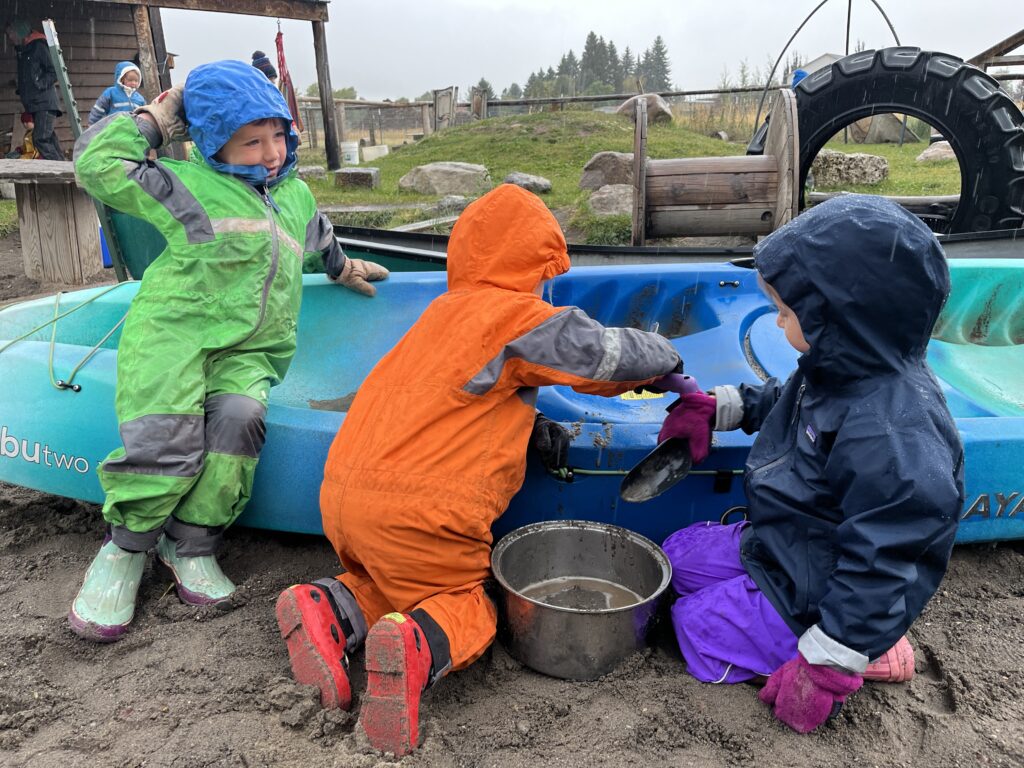At our early childhood summer camp in Jackson Hole and Victor, Idaho, we believe in the power of outdoor play—especially when it involves getting our hands dirty. From building fairy houses in the dirt to exploring the forest floor, we embrace the mess because it’s an essential part of learning and growth for young children. Here’s why we say “yes” to messy play in nature and why it’s so beneficial for our early childhood students.

1. It Sparks Curiosity and Imagination
Young children are naturally curious, and nature provides endless opportunities for them to explore and create. When we say “yes” to getting hands dirty in the dirt, we’re saying “yes” to a world of imagination and discovery. Whether it’s using sticks to build structures or mixing mud to create art, these activities allow children to let their creativity flow.
Through these hands-on experiences, children explore the textures, smells, and colors of nature, which fosters their imagination and enhances cognitive development. The open-ended play encourages children to think creatively and experiment with the world around them.
2. It Supports Sensory Development
At this stage of development, young children are learning through their senses. Getting dirty in nature provides an incredible sensory experience—feeling the texture of the soil, squishing mud between their fingers, or watching a bug crawl across a leaf. These activities help children refine their senses, supporting their sensory processing and fine motor development.
By engaging in messy outdoor play, children develop a deeper understanding of the world around them. They start to notice details they may have missed before, all while exploring and experimenting with different materials. This sensory-rich environment enhances their cognitive and physical development in a way that traditional indoor activities can’t match.
3. It Promotes Social Skills and Cooperation
In nature, children work together, share ideas, and help each other explore. Whether they’re building fairy houses, creating art in our outdoor studio, or digging to find bugs, these activities encourage collaboration. Working together fosters teamwork, empathy, and communication skills—important social skills for young children to develop.
As they engage in these group activities, children also learn how to problem-solve with others. They take turns, negotiate, and share materials—all while learning the importance of cooperation and building friendships.
4. It Encourages Physical Growth and Development
Outdoor play is not only fun but also essential for physical development. Digging, climbing, running, and crawling in nature help build muscles and improve coordination. These activities enhance both gross motor skills (like balance and strength) and fine motor skills (like hand-eye coordination), which are crucial for young children.
Getting their hands dirty encourages children to be active and move their bodies in different ways. Physical play in nature helps them develop stronger, healthier bodies while having fun outside.
5. It Teaches Emotional Regulation and Resilience
Outdoor play in nature offers a unique opportunity for young children to learn about their emotions and how to manage them. Messy play, like digging in the mud or getting dirty while building, can sometimes lead to frustration or challenges. These moments are opportunities for children to practice resilience and emotional regulation.
When things don’t go as planned, children learn to cope with disappointment, manage their feelings, and try again. Nature provides a calm, soothing environment where they can reflect, regroup, and continue exploring. This helps children develop emotional resilience and a positive outlook on challenges they might face.
6. It Builds a Connection to the Environment
When children get their hands dirty in nature, they develop a deeper connection to the earth. By interacting with the natural world in a meaningful way, they begin to understand how things grow, where animals live, and the importance of caring for the environment. These early experiences foster a sense of respect for nature and an appreciation for the planet’s resources.
Through hands-on activities like planting, digging, and observing critters, children start to learn about ecosystems and the environment in a way that is engaging and accessible. They develop a love for the outdoors that will stay with them as they grow.
7. It Encourages Risk-Taking and Problem Solving
Messy play often involves taking risks—whether it’s getting dirty or figuring out how to balance a tower of sticks. These small challenges allow children to test their boundaries, build resilience, and engage in problem-solving. When kids figure out how to make a mud pie or create a sturdy fairy house, they are learning critical thinking skills that will help them in all areas of life.
These experiences allow children to practice decision-making, experimenting with cause and effect, and learning to persist when things don’t go as expected. These are essential skills for their future growth and learning.
8. It Provides a Safe Place for Emotional Expression
Nature offers a safe space for young children to express themselves emotionally. The calm, open environment provides a perfect backdrop for children to process their feelings and explore their inner world. Getting dirty while playing in nature is an enjoyable way to let out energy, express emotions, and feel free.
Whether it’s the joy of running through the grass or the quiet reflection while collecting leaves, nature encourages emotional expression and self-awareness. Children can explore a wide range of emotions in a healthy and supportive environment.
Conclusion: Embracing the Mess, Embracing the Growth
At our early childhood camp in Jackson Hole and Victor, we embrace getting our hands dirty in nature because we know it’s an essential part of healthy development for young children. Through messy outdoor play, children build confidence, creativity, social skills, physical strength, and an appreciation for the natural world.
Nature provides an invaluable learning environment where children are free to explore, imagine, and grow. So next time your little one comes home with muddy hands, remember: they’ve been learning, discovering, and growing—one messy moment at a time. Register today for 2025 Summer Programs!


